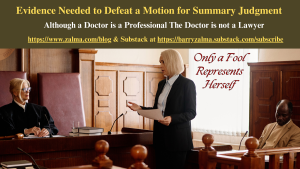Evidence Needed to Defeat a Motion for Summary Judgment

Post 4862
See the full video at https://rumble.com/v5cg419-evidence-needed-to-defeat-a-motion-for-summary-ju.html and at https://youtu.be/XkF_R6SizA0
Dr. Megan Rust appealed acting as her own attorney from the district court’s summary judgment in favor of Defendant-Appellee Laboratory Corporation of America Holdings (Labcorp) in her action alleging five California state-law contract claims.
In Megan Rust, M.D., an individual v. Laboratory Corporation Of America Holdings, No. 23-55186, United States Court of Appeals, Ninth Circuit (August 23, 2024) the Ninth Circuit resolved the issues raised by Dr. Rust.
The Ninth Circuit declined to address Dr. Rust’s argument that this action concerns whistleblower retaliation because she raised it for the first time on appeal.
Labcorp’s submission of excerpted deposition transcripts, rather than complete transcripts, in support of its summary-judgment motion was entirely appropriate.
A party asserting that a fact cannot be or is genuinely disputed must support the assertion by citing to particular parts of materials in the record, including depositions. Dr. Rust failed to produce evidence to controvert Labcorp’s evidence nor did she identify any specific material information in the omitted portions of the transcripts creating a genuine dispute.
ANALYSIS OF SUMMARY JUDGMENT ISSUES
If the party moving for summary judgment meets its initial burden of identifying for the court those portions of the materials on file that it believes demonstrates the absence of any genuine issues of material fact, then the nonmoving party must set forth, by affidavit or as otherwise provided in Rule 56, specific facts showing that there is a genuine issue for trial. The district judge is not required to comb the record to find some reason to deny a motion for summary judgment. Only disputes over facts that might affect the outcome of the suit under the governing law will properly preclude the entry of summary judgment.
The Ninth Circuit concluded that the district court did not err in granting summary judgment on Dr. Rust’s first claim, breach of contract. The district court properly concluded that:
extrinsic evidence-in the form of Dr. Rust’s acquisition of full-time malpractice insurance coverage and
LabCorp’s supposed, but uncorroborated, oral statements contracting Dr. Rust for full-time work-was barred under the parol evidence rule because the parties executed a written, integrated agreement for “part-time professional pathology services, as requested.”
When parties enter an integrated written agreement, extrinsic evidence may not be relied upon to alter or add to the terms of the writing.
Dr. Rust waived any argument of error regarding summary judgment on her claim of breach of the implied covenant of good faith and fair dealing, because her summary-judgment briefing affirmatively conceded that no genuine dispute of material fact existed with respect to this claim.
Dr. Rust’s “conclusory, self-serving” deposition testimony that Labcorp interfered with another business opportunity, standing alone, lacks detailed facts and any supporting evidence, so it is insufficient to create a genuine issue of material fact.
Dr. Rust did not point to evidence in the record, other than her own declaration, showing a triable issue of a material fact.
The fact that a judge rules against Dr. Rust is not evidence that the district judge exhibited bias or engaged in judicial misconduct. Judicial rulings alone almost never constitute a valid basis for a bias or partiality motion.
Insurance is a contract. Failure to prove the contract destroys the entire action brought by Dr. Rust in pro se. She was faced with a motion for summary judgment and failed to produce any evidence that established an issue of fact to defeat Labcorp’s motion for summary judgment and proved the maxim that a person who acts as her own attorney has a fool for a client.
I will be appearing on the “Art of Adjusting” podcast The link below is a preview of the podcast that will be posted in full next week. dropbox.com/scl/fi/ldkfrvc
 (c) 2024 Barry Zalma & ClaimSchool, Inc.
(c) 2024 Barry Zalma & ClaimSchool, Inc.
Please tell your friends and colleagues about this blog and the videos and let them subscribe to the blog and the videos.
Subscribe to my substack at https://barryzalma.substack.com/subscribe
Go to X @bzalma; Go to Newsbreak.com https://www.newsbreak.com/@c/1653419?s=01; Go to Barry Zalma videos at Rumble.com at https://rumble.com/account/content?type=all; Go to Barry Zalma on YouTube- https://www.youtube.com/channel/UCysiZklEtxZsSF9DfC0Expg
Go to the Insurance Claims Library – https://lnkd.in/gwEYk
Like this:
Loading…
Related
About Barry Zalma
An insurance coverage and claims handling author, consultant and expert witness with more than 48 years of practical and court room experience.







